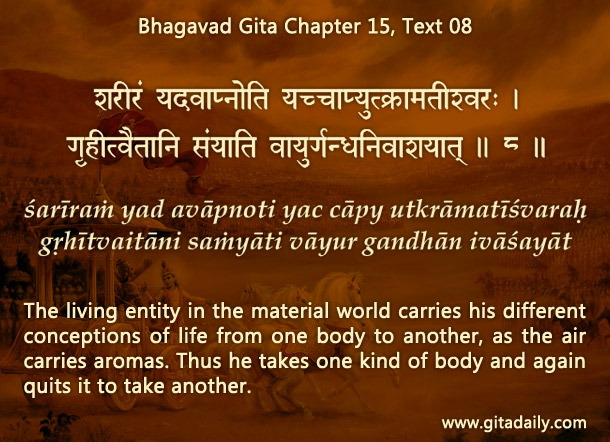Krishna begins the Bhagavad-gita’s fifteenth chapter with the upside-down tree metaphor that conveys the topsy-turvy nature of material existence. The metaphor speaks to Arjuna’s personal situation, which is similarly inverted — he has to shower with arrows venerable elders whom he would prefer to shower with flowers (02.04). Bhagavadgita
While Arjuna’s ethical dilemma is specific to him, we all encounter, sooner or later, situations that are opposite to what we desire; it’s as if we were hung upside-down. Krishna alludes to this existential predicament (15.08) when referring to the transmigrating soul as ishvara (controller). Because we are parts of God, Krishna, who is the supreme controller (15.07), we too are meant to have some small level of control. But that control becomes distressingly depleted during our embodied condition. If we compare our bodies to houses, just consider our plight: we can’t control when we will be evicted from our present house; even while we are in this house, we can’t control what will befall us or even what the modes will impel us to do; we can’t control which exact house we will go to in our next life. Indeed, for us to be considered ‘ishvara’ is more ironical than factual.
Thankfully, no matter how upside-down things become around us, one thing always stays straight: Krishna remains our sustainer and guide. The more we connect with him and act in harmony with his will, the more our actions know success (15.20), which contrasts delightfully with the inverted state where our actions end in struggle and suffering (karshati: 15.07). Bhagavadgita
Gita Daily – Thus, through the Gita’s fifteenth chapter, Krishna urges Arjuna to harmonize with his divine will — that alone will enable him to navigate his way through his conflicts to ultimate success.
One-sentence summary:
Through the upside-down tree metaphor and the subsequent fifteenth chapter analysis, Krishna places Arjuna’s specific predicament in a broader existential context and offers a universal guideline for living effectively.
Think it over:
- How does the upside-down tree metaphor speak to Arjuna?
- How does Krishna’s usage of ishvara for the soul reflect the world’s nature?
- How can we go beyond the world’s inverted nature?
***
15.08: The living entity in the material world carries his different conceptions of life from one body to another, as the air carries aromas. Thus he takes one kind of body and again quits it to take another.
To know more about this verse, please click on the image


Hare Krishna
Wonderful verse